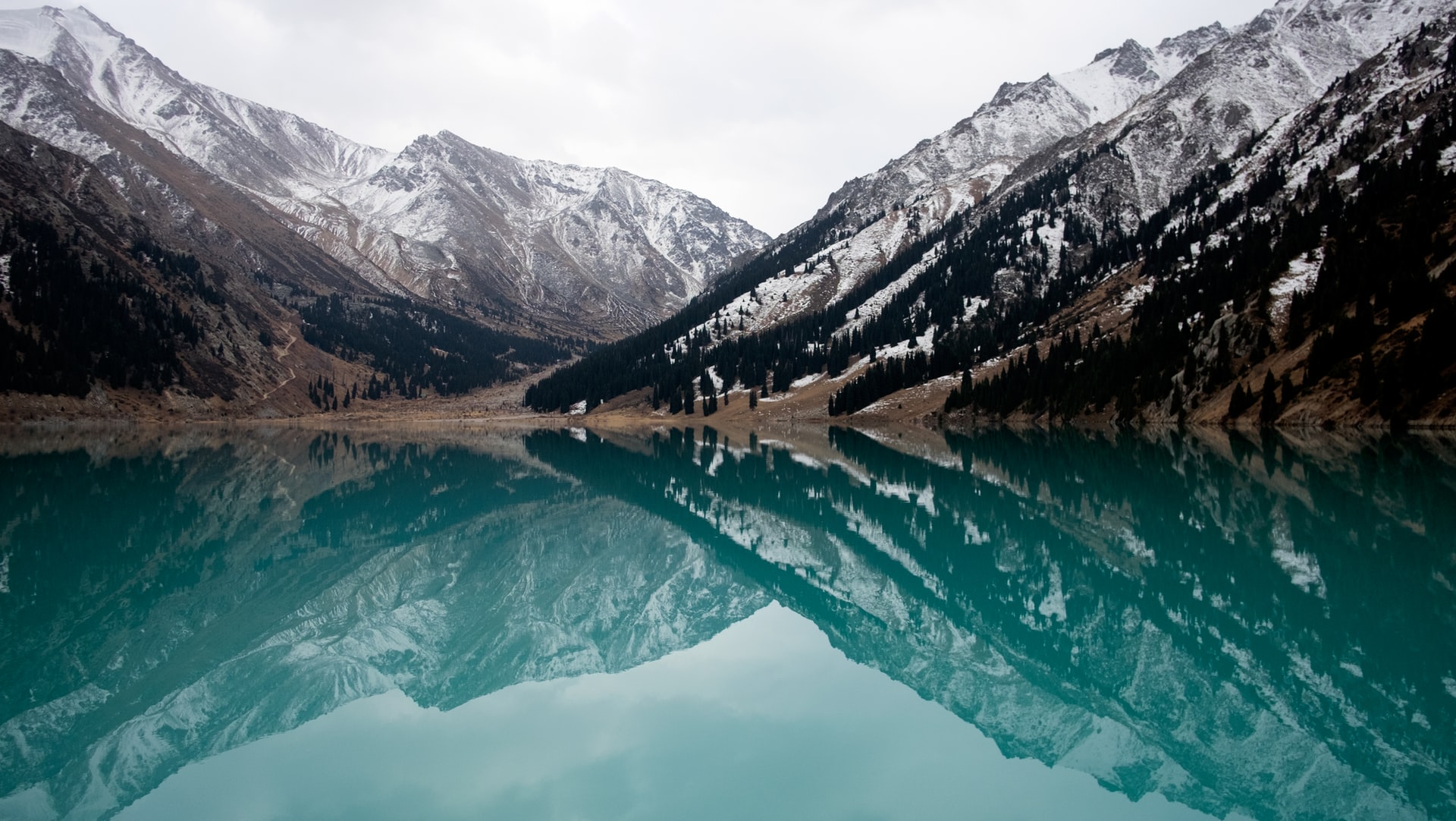
Ecotourism is the fastest growing sector in the tourism industry, accounting for 25 percent of the global tourism. According to the United Nations World Tourism Organization, the number of ecotourists is increasing annually by 20 percent.
Kazakhstan, with its abundance of pristine natural sites, has a huge potential for the development of ecotourism. Breathtaking natural landscapes, unique ecological trails, combined with ethno-cultural tourism, will impress even the most exacting tourist.
What is ecotourism?
The International ecotourism society defines ecotourism as responsible travel to natural areas that preserves the environment, supports the well-being of the local community and involves sightseeing and educational activities.
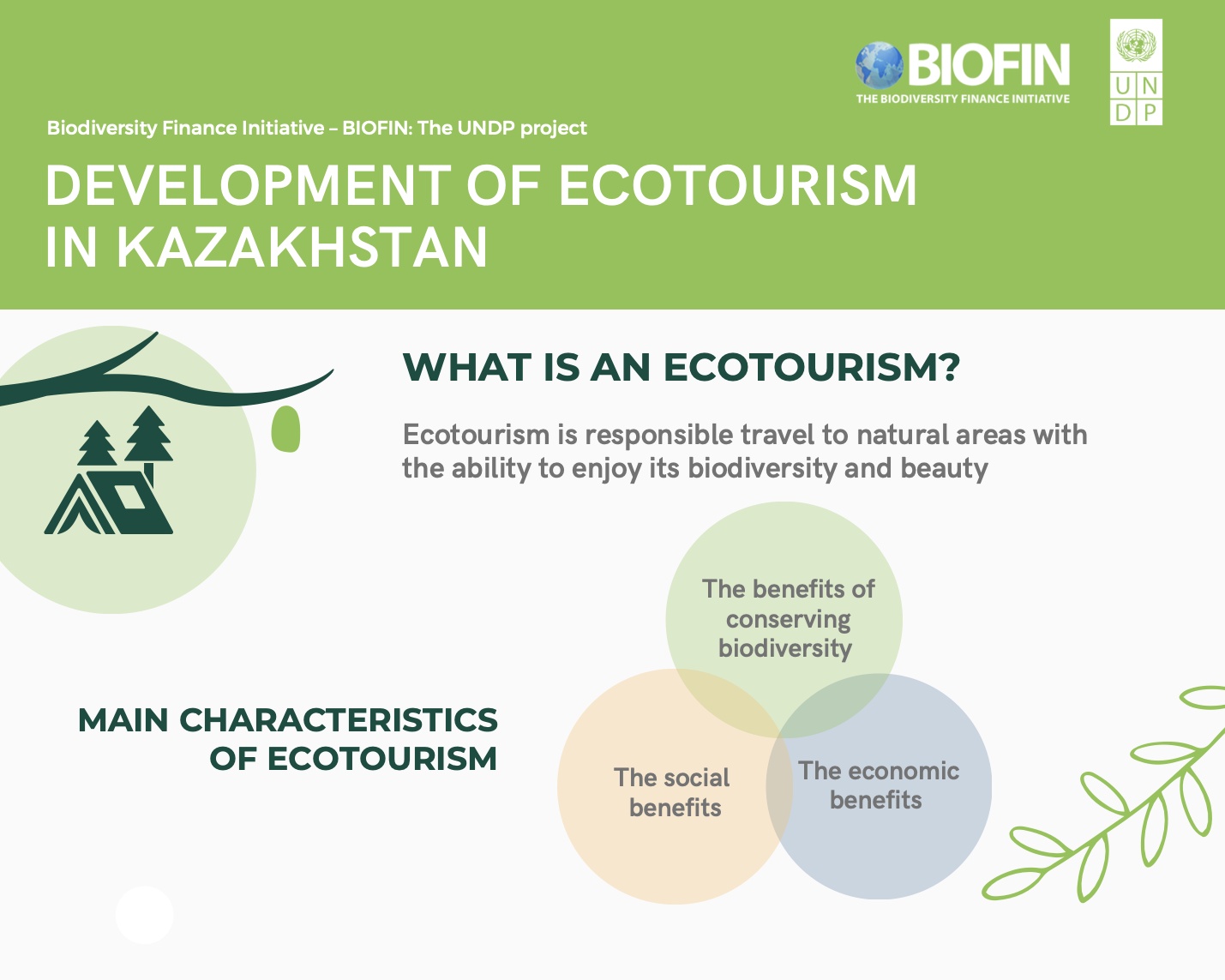
What is the difference between ecotourism and other types of tourism?
The main feature of ecotourism is the preservation of biodiversity and ecosystems when visiting natural areas. Ecotourism also enables the creation of economic conditions in which nature conservation becomes beneficial for local communities.

Ecotourism in the world and in Kazakhstan
According to the Forestry and Wildlife Committee of the Ministry of Ecology, Geology and Natural Resources of the Republic of Kazakhstan, the total land of specially protected natural areas of the country is 26 million hectares, that is about 0.26 million km2 is tenfold more than in the countries with well-developed ecotourism. At the same time, the number of tourists is 2 million people per year. Meanwhile, in the United States of America, a global leader in the development of ecotourism, this figure is 200 million tourists per year and in Australia it is 60 million. These countries have achieved such results through a well-established system of tourism management in the national parks and natural areas, regulated by law.
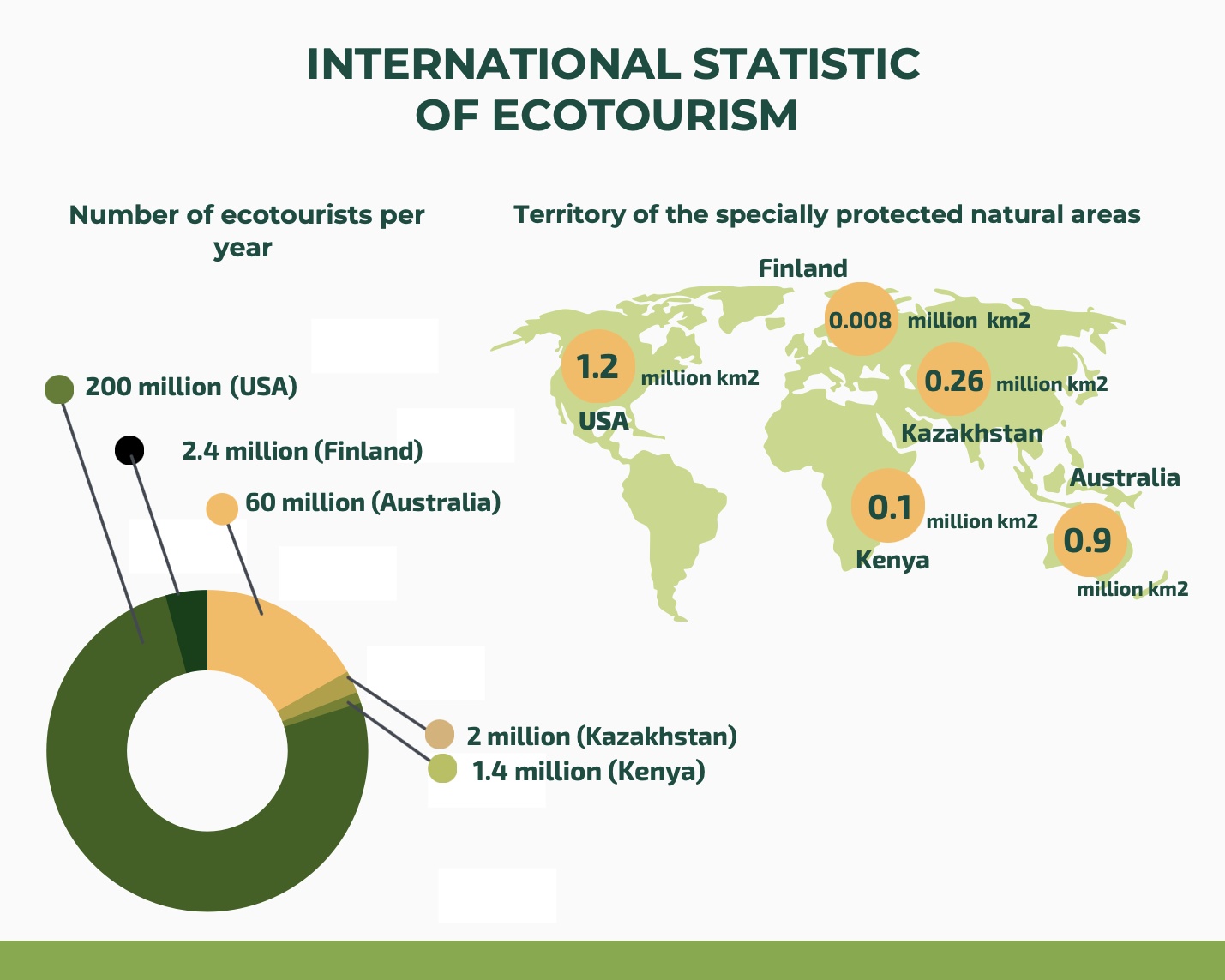
Potential of ecotourism development in Kazakhstan
In 2019 Finland was named the best country to visit for wildlife travel through to a high level of environmental sustainability, the diversity and uniqueness of plant and animal species and also thanks to government efforts to preserve the environment. Regarding the list of the best countries in terms of the number of national parks, biodiversity, the risk of extinction of Red List species of plants and animals and other criteria, Kazakhstan took the 87th place in this rating.
Nevertheless, the country has all the prerequisites for the development of ecotourism, due to its vast natural areas, the diversity of its flora and fauna and its natural monuments and objects that are included on the World Heritage List.
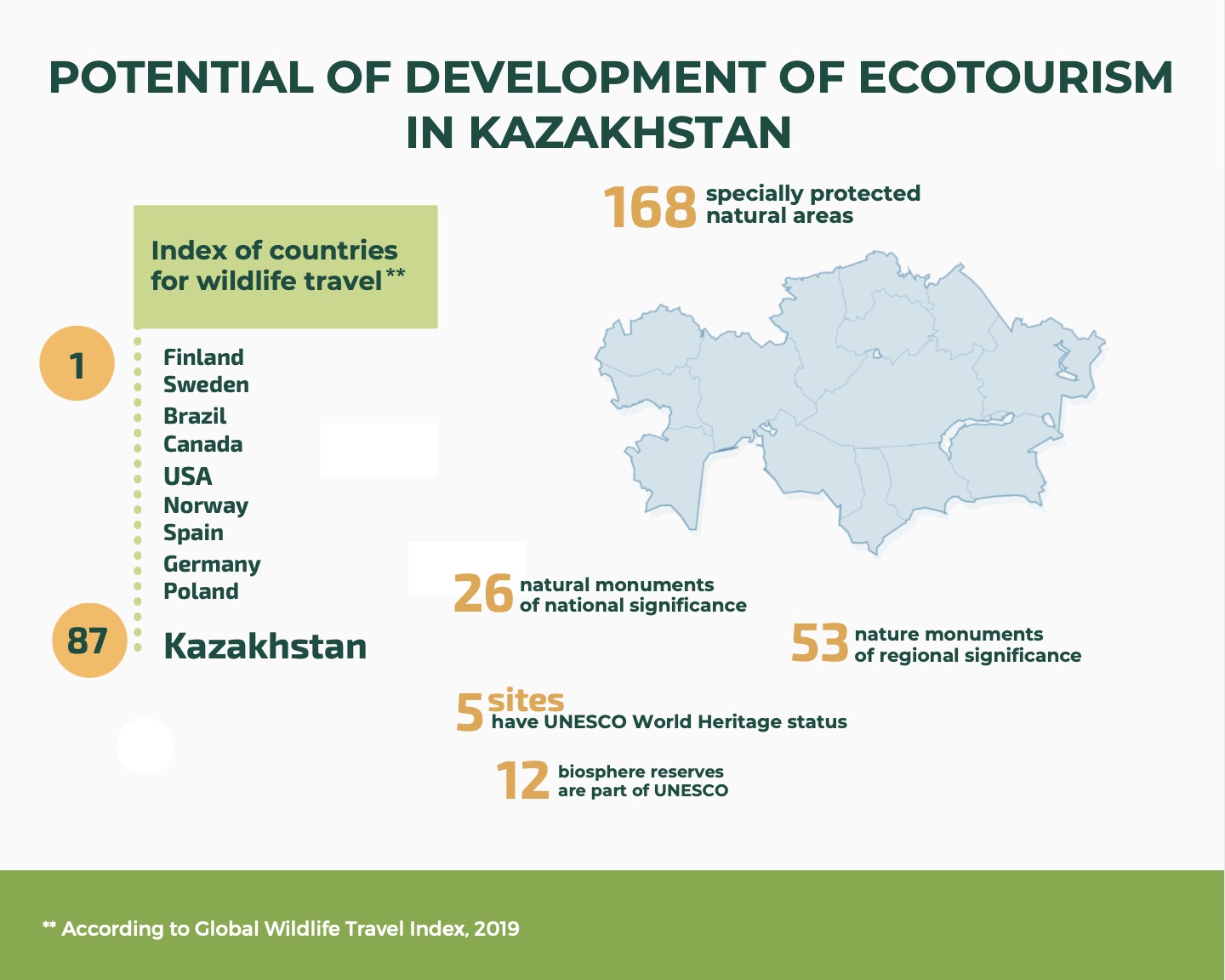
Work and recommendations of UNDP in the field of ecotourism development
At the initiative of the Biodiversity Finance Initiative (BIOFIN) project of the United Nations Development Programme (UNDP) additions have been made to the new Environmental Code of Republic of Kazakhstan, which establish the obligations of tour operators and travel agents to be guided by certain principles regarding the organization of tours in protected areas. These include:
- Planning the number of tourists;
- Preventing harm to the environment;
- Choosing an eco-friendly mode of transportation;
- Involvement of the local community for the organization of tours;
- Waste minimization and briefing of tourists.
As part of their work on ecotourism, experts from the UNDP Global Environmental Finance and BIOFIN-UNDP projects developed the following recommendations for improving the development of ecotourism in the country:
- The inclusion of a definition of ecotourism, standards of responsibility for non-compliance with the requirements for organization of ecotourism, building standards in the territories of specially protected natural areas, the introduction of methods for calculating recreational loads and the single standard for arrangement of trails at the legislative and subordinate levels.
- Improvement of the management plan of specially protected natural areas on the development of tourism, including addressing such issues as the inclusion of directions for recreational loads, planning for the arrangement of trails and territories, environmental impact monitoring and interaction with the local community and business for organization of tours.
- Development and implementation of national standards for the provision of tourist services in specially protected natural areas and in the field of ecotourism.
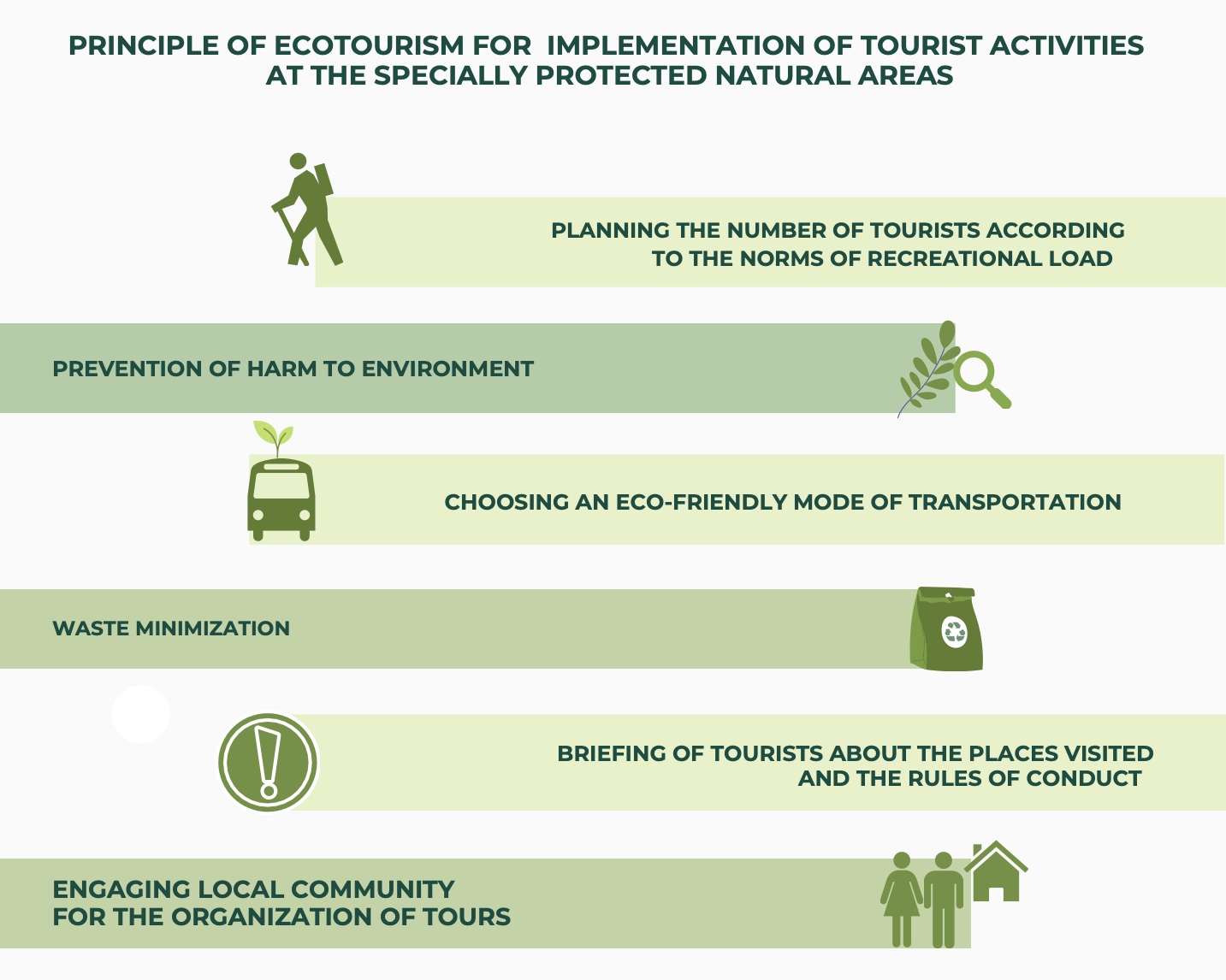
To date, the existing standard approaches that were developed in legislation of Kazakhstan need a clear definition of legal relations and mechanisms and criteria for their regulation. Therefore, the inclusion of the above recommendations and a definition of ecotourism in the national laws of Kazakhstan enables to streamline all regulatory legal acts in tourism sector, as well as to promote the improvement of environmental protection measures at the territories. At the same time the authorized bodies in sphere of tourism and ecology need to develop appropriate action plans and reconsider existing methods of tourism management in natural areas.
It is worth remembering that ecotourism can contribute to national economic development in any country where protection and restoration of natural environments is increasingly accorded priority, accompanied with strong regulatory oversight to ensure their preservation.
Categories
Archives
- February 2026 (1)
- January 2026 (3)
- December 2025 (2)
- November 2025 (5)
- October 2025 (5)
- September 2025 (2)
- August 2025 (10)
- July 2025 (9)
- June 2025 (5)
- May 2025 (8)